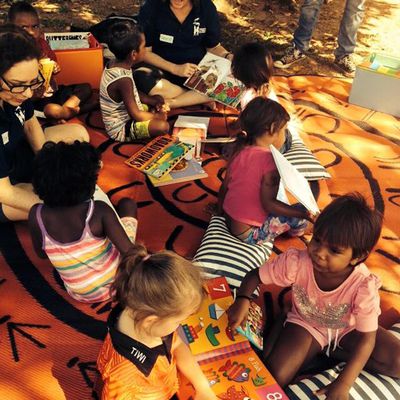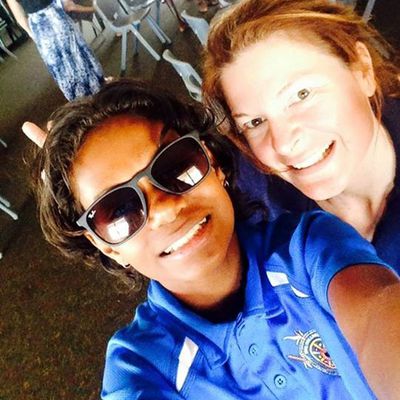Emily Harms, our head of Marketing and Communications, was recently invited on a field trip to the Tiwi Islands to see the Indigenous Literacy Foundation (ILF) in action. She reports back here.
The Indigenous Literacy Foundation (ILF) has been doing incredible work since it was founded in 2004 by Riverbend Bookshop owner Suzy Wilson, with the aim of improving literacy levels in remote indigenous communities. The response from the Australian book industry was overwhelming, leading to The Foundation raising $25,000 in its first year and donating 60 books. This year, The Foundation has raised $600,000 to date with a target of $1,000,000.
Each year, the ILF invite writers, artists, singers and authors to work with indigenous children in remote schools on literacy projects. These projects are designed to help raise literacy levels through painting, writing or song writing.
This time, I was one of the lucky representatives from the Australian book industry invited along to assist the artists with their projects for five days on the Tiwi Islands.
Our party included: Karen Williams (ILF Executive Director); Tina Raye (ILF Indigenous Program Manager); Sharon Galleguillos (ILF Chair); Louise Sherwin-Stark (Managing Director at Hachette); Kristin Gill (General Sales Manager for Children’s Book at Penguin Random House); Norma MacDonald and Fern Martin (artists and illustrators for Magabala Books); Dave Hackett (YA author and cartoonist); and, Chris Aitken (songwriter and musician).
The Tiwi Islands comprise of Bathurst and Melville Islands and nine smaller uninhabited islands. The population is a few thousand for both the larger islands. Before this trip, all I knew of these Islands is that they were at the very top of Australia. Now, I’m not going to claim that during my five-day visit, I’ve learnt everything about the Tiwi communities and Tiwi culture but I certainly know a lot more than before I went (including that Tiwi Islands means ‘we’).
After a frighteningly early start on one of those typically dark, wet winters Melbourne mornings, I headed off to balmy Darwin to meet the ambassadors from various corners of Australia. Here we were divided into three tiny aircrafts and headed 80kms across land and sea. The beautiful turquoise sea glistened beneath me on the 20-minute flight and I focused my attention on the crocs that were no doubt lurking in the waters below in order to distract my attention from the tiny plane bouncing around in the sky.
Once we had safely landed, we arrived at Tiwi College. This is the only high school located on Melville Island. Students are collected from the other Islands every Monday morning. They stay in family group homes on Melville Island for the school week and then head back to their own homes and families (with some of them based on Bathurst Island) on Fridays. We were warmly welcomed to the College with a brief introduction to Tiwi culture by Ian Smith, the school’s Principal for the past seven years, and Greg, a teacher, football coach and lead singer of Tiwi band B2M (Bathurst to Melville).

We spent time in Milikapiti – a local community about one-hour drive from Tiwi College. In these school visits, the artists wowed the kids by drawing various characters and animals, later encouraging them to draw and paint their own. The artwork created by the children was truly incredible. As well as assisting with the classroom activities, I read books to the younger kids and joined the older ones in their reading groups. The kids I met were friendly and curious about what part of Australia we visitors had come from and whether we had kids of our own.
Our short time on the Island was jam-packed. One day, we visited the local art gallery in ‘Mili’, where we were enthralled by the superb artwork of the local Tiwi artists. On the way back to Tiwi College, we were stared down by an angry-looking buffalo in our mini-van.
Each of the school visits ended with the chance for the students to choose a book from the beautiful range of children’s books. The books’ topics were as diverse as local Indigenous issues, space, predators and footy (the Tiwi obsession). Each child also received a ‘Reading opens doors’ t-shirt, donated by ILF. It was thrilling to see the students’ faces light up when they got to choose their own books.
Throughout the week, my cooking skills were certainly put to the test. On one occasion we were cooking 60 sausages and 50 chops, as well as preparing giant salads – using some fresh produce from the College veggie garden. This meal was for the whole Tiwi College community as part of their regular Thursday gatherings. Each week the families rotate who cooks for everyone which is only fair considering there are over 100 hungry mouths to feed. After the delicious feast, the older girls and boys broke into a feisty game of basketball while the younger ones showed off their acrobatic skills on the trampolines. The teachers later joined them and – despite lacking the prowess of the Tiwi kids – somehow managed to shoot more hoops!
Seeing the work of ILF first-hand was such a rewarding experience. Their approach to raising literacy levels is focused at a community level with an emphasis on early exposure to appropriate, quality books in the home and community. In addition, ILF strongly supports first language and culture, and works with communities to translate books so they represent both English and first language. They are also committed to encouraging and supporting the development of community stories through publications.

Some of the older girls have been working with well-renowned children’s book author and illustrator, Alison Lester, to produce a beautiful new book: No Way Yirrikpay. This book incorporates some Indigenous words into common usage (yirrikpay = crocodile) and rhyming text (“No way Yirrikpay, You’re not eating me today”) to create something wonderful. Look out for No way Yirrikpay for when it arrives here at Readings in late September.
Supporting the work of ILF is so important. Statistics clearly show that between 40% and 60% of Indigenous children in very remote locations across WA, SA and NT are achieving below minimum standard in Reading in Year 3. As a nation, this is certainly not something we can ignore. With no Government funding, the ILF relies on donations from people like you and me. As today is Indigenous Literacy Day, it’s the perfect time to donate. In addition, 10% of all sales made on this day at Readings will also be donated to the ILF.


